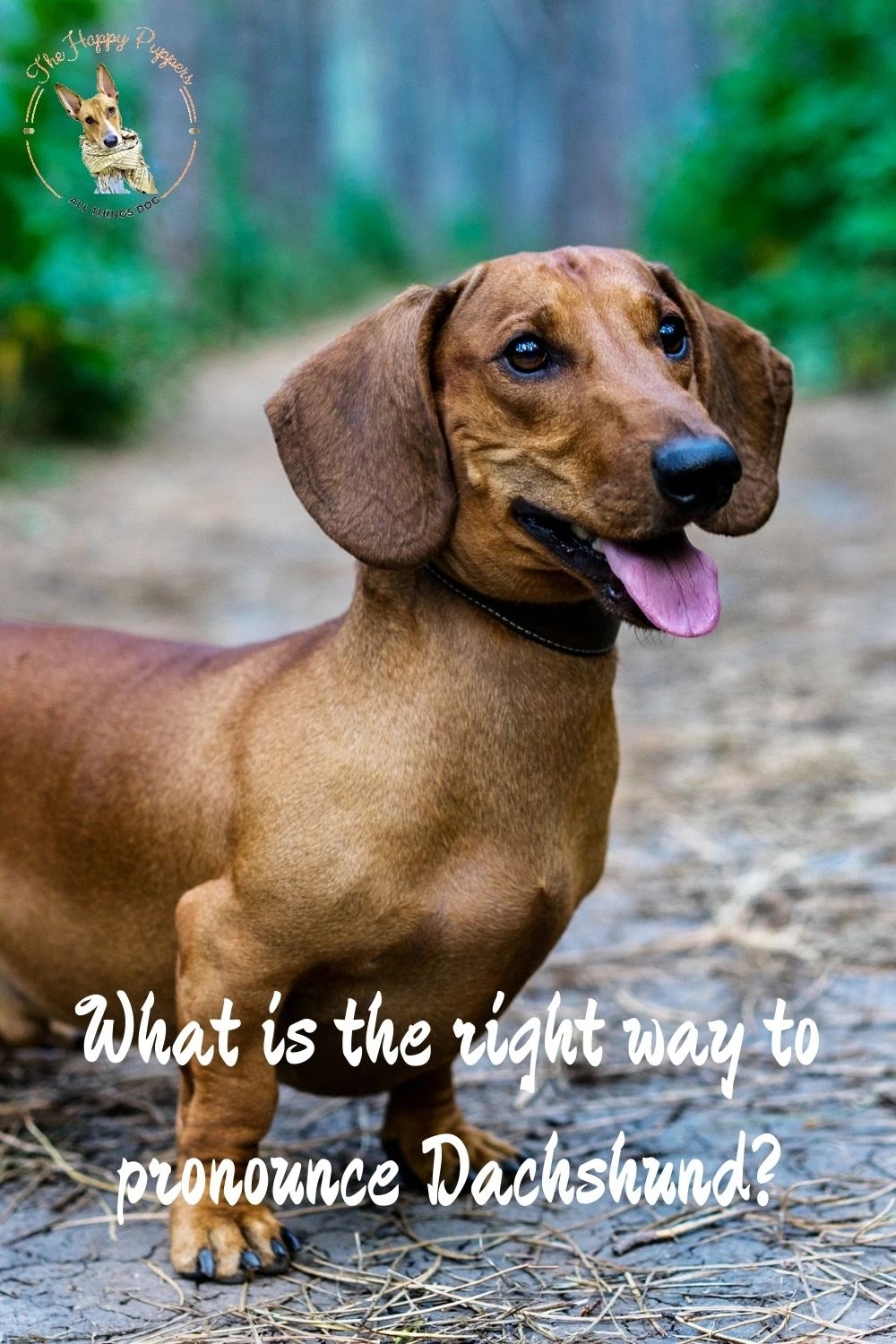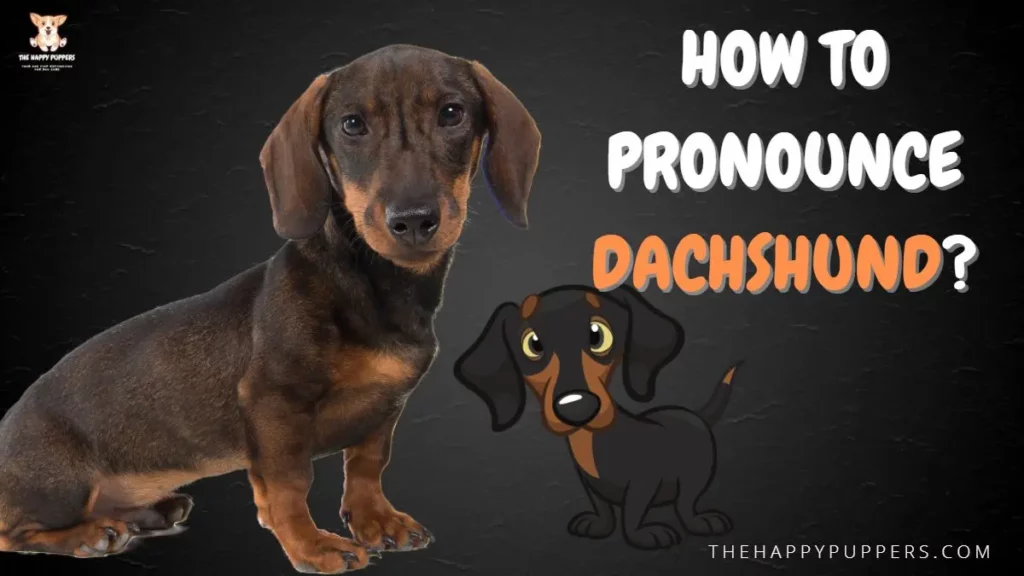Guest Post for The Happy Puppers
Each year you can easily set your clock to the fact that Dachshunds will be ranked among the world’s most popular breeds. And yet, as universally loved as these dogs are, their name is as misunderstood as their popularity is great!
This article will delve into the the rabbit hole of this breed’s name, mainly covering the pronunciation of this breed’s name, but it’ll also dig into the origin story of Dachshunds, tracing its fascinating history back when Dachshunds were first bred in Germany.
 |
| How to Pronounce Dachshund? |
Topics covered in this blog post
How to Pronounce “Dachshund”
The first step in unravelling the story of the Dachshund name is in learning its pronunciation.
In short, the proper pronunciation of “Dachshund” is actually by pronouncing it as ‘daks-hoont’ rather than the popular (though technically incorrect) ‘dash-und’ or ‘dash-hound’.
But how and why is ‘daks-hoont’ the correct pronunciation? Here are 3 steps to fully unpack and understand this pronunciation of the Dachshund name.
Step 1: The Meaning of the Name “Dachshund”
In German, “dachs” means badger, while “hund” means hound or dog. Hence, the words combine to produce “Dachshund”.
As you can probably guess, Dachshunds were originally bred to actually hunt badgers, boars, rabbits, and other burrowing animals. Back in the medieval times of the 1400s, when Dachshunds first appeared in recorded history, hunters, ranchers, and everyday people in Germany had an unfulfilled need for a dog who could hunt above and below ground. The motivation for hunting came from a need to protect farm animals, eat food, or simply for leisure.
Thus, German dog breeders were given their task to create an ideal hunting dog, who could hunt below ground as well as above. Thanks to their efforts, Dachshunds exist today! Contrary to their cartoonish look at first glance, upon a closer look it’s clear how they’re perfectly built as underground hunting dogs; their body is low to the ground, with paws perfect for digging; their floppy ears prevent dirt from getting in; their tails are perfect last-resorts in case their owner needs to pull them out of a hole; their belchy barks are great to signal that prey is close by; and their fearless mentality is perfect for them to dive head-first into a badger burrow.
Interestingly, cynologists (which are scientists who study dogs), have also found other given names for Dachshunds, including the following:
Dachs Kriecher
This name means, “badger crawler”.
Dachs Krieger
This name translates to “badger warrior”.
Step 2: How to Pronounce “Dachs”
This is the first-half of Dachshund, which again translates to “badger” in German.
It’s popularly mispronounced as “dash” by English speakers, but actually it’s pronounced “dax”. That’s because the letters ‘chs’ in German usually produce an ‘x’ sound.
Step 3: How to Pronounce “Hund”
Next, the German word “Hund” (which translates to hound, or dog) is actually pronounced as ‘hoont’, rather than the popular mispronunciation of ‘hound’ or ‘hund’. This is because the German “un” is like an ‘oo’ sound.
And there you have it! The correct pronunciation of Dachshund is like ‘dax-hoont’, rather than ‘dash-ound’ or ‘dash-und’.
Bonus Step: Watch Video Instructions
To be doubly sure that you’ve nailed the pronunciation of “Dachshund”, here’s an excellent video of a native German speaking Dachshund owner, who helps to clear the mud in explaining the pronunciation of “Dachshund”.
Pin this article for later:
 |
| Pin it! |
Other Nicknames for Dachshunds
Much more than most breeds, Dachshunds have a plethora of nicknames. Maybe this stems from how unintuitive it is for non-German speakers to pronounce the name, or because of how cartoonish Dachshunds looks – or maybe a combination of both!
Below, you’ll find a list of common Dachshund slang names.
Daxie
Now that you’ve learned that the real pronunciation of “Dachshund” is ‘dax-hoont’, it’s no surprise why in Britain Dachshunds are lovingly referred to as “Daxies”.
The nickname is short and sweet — just like the dogs themselves.
Doxie
Most likely because American people started hearing British people calling Dachshunds as “Daxies,” with a British accent, many in the USA have re-written the nickname with American phonetic spelling as “Doxie”.
Sausage or Wiener Dogs
Of course, the nicknames which Dachshunds have as “Sausage” or “Wiener” dogs hardly need any explanation – they simply look like cute Italian sausages, trotting about.
Teckel
A northern Germanic name for Dachshunds is the name “Teckel”. It’s usually used by northern German people, referring to their standard-sized Dachshunds who are trusty hunting companions.
The term “Teckel” is also used in Britain, where it specifically refers to wirehaired Dachshunds, which are one of three Dachshund types.
To clear up any confusion, in Germany, Teckels refers to all types of dachshunds, with a connotation that they’re hunting Dachshunds. On the other hand, in the UK, Teckels refers specifically to wire-haired dachshunds.
Dackels
Another region-specific name for Dachshunds can be found among the people of southern Germany, which is the term “Dackels”.
While “Teckels” is again used more so in northern Germany, and with more of an implication that the Dachshunds are hunting dogs, “Dackels” is more popular among southern Germany, and more often refers to hunting Dachshunds as well as house-pet Dachshunds.
Why do Dachshunds Have a Name That Means “Badger Hounds”?
With a bloodline that traces back centuries further than the Kardashian dynasty, the first documented evidence of Dachshunds appears in the 1400s, in today’s region of Germany.
Originally bred from an alchemic mixture of various terriers, spaniels, and pinschers, the primary purpose of dachshunds was to hunt burrowing animals, such as rabbits, foxes, boars, and – last but not least – badgers.
To simply capture this meaning into the breed’s name, the German people who initially bred these dogs named them “badger hounds”.
For many Dachshund owners today, it’s shocking to know that their affectionate dog’s ancestors were formidable hunting dogs, who’d readily spar with a badger or a boar, given the chance. Yet with a bigger magnifying glass, maybe it’s not as much of a surprise, knowing the charmingly mischievous side of Dachshunds, and how they love to dig holes.
Over the years, especially in the 1800s, when all sorts of dog breeds began developing at a fast pace, dachshunds also went through a transformation of their own. As one big change, the gears of industrialization were quickly churning in Europe, so dogs weren’t needed to work as much, so they transitioned more and more into being house-pets. Thus, it was no coincidence that miniature Dachshunds, who didn’t need to hunt, began being bred in the latter half of the 1800s.
Today, Dachshunds come in a mix of hairstyles and sizes, mostly living their lives inside humans’ homes as house-pets. Yet, their instincts as actual “dax-hoont badger hounds” still lives in their DNA – for example, Dachshunds love following scents outside, enjoy digging holes at the beach, and have their stretchy skin which is great for avoiding abrasions with the dirt.
 |
| Know the right way to pronounce Dachshunds. |
Conclusion
In this article, you’ve learned how to more properly pronounce the name of Dachshunds, and gained an understanding around the “badger hound” history behind its name.
Now, you can count yourself among the minority of English-speaking Dachshund lovers who can impressively nail the name’s pronunciation!
Other Breed Names that Are Difficult to Pronounce
Here are just a few other dog breed names which are commonly mispronounced, similar to Dachshunds.
Newfoundland
This breed is commonly pronounced as ‘new-found-land’, when in fact it’s actually pronounced as ‘noo-fund-lund’.
Shih-Tzu
While this breed’s name is commonly pronounced as a swear word, it’s actually pronounced as “she’d zoo”, pronounced quickly.
Xoloitzcuintli
If you mispronounce this dog, you deserve no blame whatsoever! Even after learning how to pronounce this breed’s name, it’s tricky to remember the pronunciation. It goes like this: ‘show-low-itz-queen-tlee’.
Writer Bio
Guest Writer: Mitchell Park
Mitchell is a content creator for Spot Dog Walkers. Born and raised in Alberta, Canada, Mitchell enjoys delta blues music and has grown up with dogs all his life. Now, he’s proudly working to help Spot become Canada’s #1 choice for hiring dog walkers nearby.
Pin this article for later:
 |
| Pin it! |

